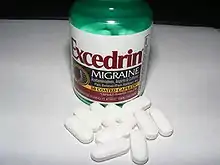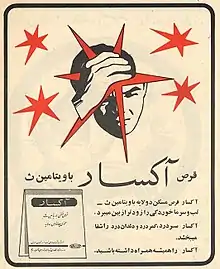Excedrin (brand)
Excedrin is an over-the-counter headache pain reliever, typically in the form of tablets or caplets. It contains paracetamol (acetaminophen), aspirin, and caffeine. Until late 2005 it was manufactured by Bristol-Myers Squibb, but in July 2005 it was purchased by Novartis, along with other products from BMS's over-the-counter business. As of March 2015, GSK holds majority ownership of Excedrin through a joint venture transaction with Novartis.[1]

Excedrin was one of the top ten selling over-the-counter medicine brands in the United States.[2] There are other brands on the market that contain the same combination of drugs, such as the Roter APC tablets available in Europe.
The brand became known for advertisements in which Excedrin cured especially unpleasant and excruciating headaches (which were termed in the advertisements as "Excedrin headaches", later called "Excedrin tension headaches").
In 2007, the brand branched out into marketing for other types of pains with the introduction of Excedrin Back & Body, which removed the caffeine from the normal mixture.
Excedrin features extensively in the 1977 novel, 'The Shining (book)' by Stephen King as a headache relief for Jack Torrance.[3]
Versions

Over the years, different types of the drug were introduced:[4][5]
- 1960: Excedrin Extra Strength (the formula changed for the last time in 1978)[6] In 1960, Bristol-Myers Squibb introduced Excedrin Extra Strength for headaches, the first multi-ingredient formulation headache treatment product.[7] Contains 250 mg acetaminophen, 250 mg aspirin and 65 mg caffeine
- 1969: Excedrin PM – The first headache and sleeping pill combined product.[7] Contains 500 mg acetaminophen and 38 mg diphenhydramine citrate as a sleep aid, the same active ingredients as Tylenol PM, which was introduced several years later.
- 1998: Excedrin Migraine – At the beginning of 1998, the FDA granted clearance to market Excedrin Migraine for the relief of migraine headache pain and associated symptoms. Excedrin Migraine continued the trend of marketing pain products for specific types of pain, becoming the first migraine headache medication available to consumers without a prescription,[8] even though it has identical active ingredients to the regular Excedrin Extra Strength product, 250 mg acetaminophen, 250 mg aspirin and 65 mg caffeine. In fact, upon the product's launch, its advertising slogan was “Excedrin is now Excedrin Migraine,” noting that the two were the same product.
- 2003: Excedrin Tension Headache contains 500 mg acetaminophen and 65 mg caffeine.
- 2005: Excedrin Sinus Headache contains 325 mg acetaminophen and 5 mg phenylephrine HCl as a decongestant.
- 2007: Excedrin Back and Body – a dual-ingredient formula claiming that it "works two ways—as a pain reliever and a pain blocker right where it hurts". Contains 250 mg acetaminophen, 250 mg aspirin.[9]
- Discontinued – Excedrin Menstrual Complete Excedrin Menstrual Complete continues the trend of marketing pain products for specific types of pain, even though it has identical active ingredients to the regular Excedrin Extra Strength product and Excedrin Migraine, 250 mg acetaminophen, 250 mg aspirin and 65 mg caffeine.
Ownership
In 2005, Bristol-Myers Squibb announced the sale of its North American consumer medicine business (including Excedrin, Comtrex and Keri brands) to Novartis for $660 million, in order to focus on drugs for the ten most profitable disease areas.[2] As of March 2015, GlaxoSmithKline holds majority ownership through a joint venture transaction with Novartis.[1]
Recall and production stoppage
2012 recall
On January 9, 2012, Novartis announced that it was voluntarily recalling all lots of select bottle-packaging configurations of Excedrin products with expiration dates of December 20, 2014, or earlier as a precautionary measure because the products may contain stray tablets, capsules, or caplets from other Novartis products, or contain broken or chipped tablets. The recall was conducted with the knowledge of the U.S. Food and Drug Administration.[10] Wholesalers and retailers were instructed to stop distribution and return the affected product. Consumers in possession of recalled Excedrin were instructed to stop using the product and contact Novartis. Novartis stated that Excedrin would be shipping to stores on October 15, 2012, and that customers would start seeing it by the first of November.[11]
2020 production stoppage
On January 21, 2020, GlaxoSmithKline announced that production and distribution of caplets and gel tabs of Excedrin Extra Strength and Excedrin Migraine would be stopped temporarily. Their statement said, "Through routine quality control and assurance measures, we discovered inconsistencies in how we transfer and weigh ingredients" for the recalled products, and that production would restart "shortly".[12][13] However, GSK acknowledged that they "cannot confirm a definite date as to when supply will resume".[14]
See also
- Stella Nickell, who tampered with Excedrin tablets[15]
References
- "GSK/Novartis Transaction". Archived from the original on 2016-12-18. Retrieved 2016-12-15.
- "Novartis swallows Excedrin". Daily Record. April 15, 2005.
- King, S.(1977) The Shining. 2007 edn. London: Hodder and Stoughton
- "Relief for Tension Headache Pain – Bristol-Myers Squibb Launches Excedrin(R) Tension Headache". BMS News. June 2003.
- "Excedrin.com > Product Guide". Nov 12, 2006. Archived from the original on November 10, 2006. Retrieved November 12, 2006.
- "Bristol-Myers Squibb Announces Injectable Acetaminophen Licencing Agreement – Agreement Expands Existing Pain Management Portfolio". BMS News. January 28, 2002.
- "New Headache Relief – No Water Needed". Bristol-Myers Squibb. October 7, 2002.
- "Bristol-Myers Squibb News". Bristol-Myers Squibb. Archived from the original on 2007-05-20. Retrieved 2007-05-08.
- "Excedrin Back & Body". Excedrin.com. Archived from the original on 2007-05-19. Retrieved 2007-05-08.
- "Excedrin Recall". FDA.gov. January 9, 2012.
- Voight, Joan (September 4, 2012). "Excedrin and Tylenol Suffer Recall Headache". Adweek.
- White, Dawson (January 21, 2020). "Excedrin is temporarily stopping production of two drugs meant to treat migraines". Miami Herald. Retrieved January 23, 2020.
- Grumman Bender, Rachel (January 22, 2020). "What migraine sufferers need to know about Excedrin as production is halted". Yahoo Lifestyle. Retrieved January 23, 2020.
- Karimi, Faith (January 22, 2020). "Two Excedrin products are temporarily discontinued, company says". CNN. Retrieved January 23, 2020.
- "Tylenol Terrorist". Crime Library. Archived from the original on 2005-06-24. Retrieved 2005-11-13.
